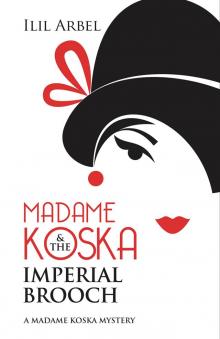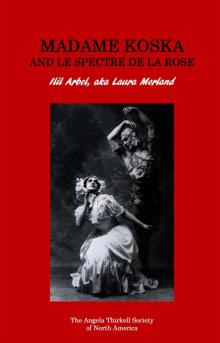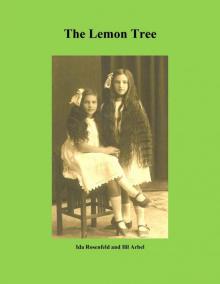- Home
- ILIL ARBEL
Madame Koska & the Imperial Brooch
Madame Koska & the Imperial Brooch Read online
“…A perfect period puzzler, Madame Koska and the Imperial Brooch is clever, concise, occasionally comical…”
~ Jay Strafford, books editor, Richmond Times-Dispatch ~
“Agatha Christie reborn. A veritable tour de force of the twenties’ London fashion scene with our heroine the Madame (if one may use the word in this sense) of an up and coming atelier. We meet Russian émigrés down on their luck and have a stolen brooch being sought by the thieves who hid it too well. Ilil Arbel has adopted the mantle of the Grande Dame of this age and produced a stunning book full of fun and the obligatory twisted ending. Don’t miss it!”
~ Lord David Prosser, author of the Barsetshire Diaries ~
“Madame Koska is an absolutely unforgettable character whose charms and eccentricities linger on long after you’ve finished this marvelous page-turner. Here’s to hoping this is only the beginning of a wonderful new series.”
~ Gary Morgenstein, playwright and author of A Mound Over Hell ~
“…I didn’t know whodunit until the very last few pages.”
~ Wayne Zurl, author of the Sam Jenkins Murder Mysteries Series ~
madame koska & the Imperial brooch
Copyright © 2015, 2017 Ilil Arbel
All rights reserved. Except as permitted under the U.S. Copyright Act of 1976, no part of this publication may be reproduced, distributed, or transmitted in any form or by any means, or stored in a database or retrieval system, without prior written permission of the publisher.
This book is a work of fiction. The characters, incidents, and dialogue are drawn from the author’s imagination and are not to be construed as real. Any resemblance to actual events or persons, living or dead, is entirely coincidental.
Published by Open Window
an imprint of BHC Press
Library of Congress Control Number:
2017945135
Print edition ISBN numbers:
Hardcover: 978-1-947727-20-5
Softcover: 978-1-946848-53-6
Visit the publisher:
www.bhcpress.com
The Lemon Tree
Miss Glamora Tudor
Their Exits and Their Entrances
Ancient Aliens
The Cinnabar Box
A Few Steps in the Other Direction
I would like to thank all the wonderful people who went beyond the call of duty to help with this book. They are listed in alphabetical order of their last name, since how else could I establish precedence?
Ms. Kathleen Fish
Dr. Penelope Fritzer
Ms. Barbara Houlton
Mr. Gary Morgenstein
Lord David Prosser
Ms. Janet Schmelzer
Mr. Jay Strafford
Ms. Susan Verell
Ms. Louanne M. Wheeler
Mr. Wayne Zurl
In the beginning, Anthony Trollope created Barset and Barchester.1 And he saw that they were good. Five great tomes had been writ, and he was labouring on the sixth, when a dreadful calamity befell the mighty author. As he sat meditating at the Athenaeum Club, a conversation between two clergymen reached his ears; they were disparaging the beauty of his creations, calling his Barchester characters tired and over-familiar. Great rage seized the literary giant. He rose from his seat and strode toward the offending vicars. “I shall not write another Barchester novel,” he thundered. “And the anger of my readers will follow you unto the seventh generation, since it was your doing and yours alone.” Pale and frightened, the clergymen begged him to reconsider, fearing for their very lives. He refused. “At least finish the novel you are creating now,” said one of them, trembling like a leaf, “Or you will be our death.” Trollope’s kind heart relented a little, and he promised them he would finish that novel, but no more. “You shall not perish,” he added, “but the book will be named The Last Chronicles of Barset.”2 And so it came to be. The mighty author moved on to the political novels, and never returned to his beloved Barchester, which is a great pity since I would have liked to read more about Signora Neroni and the rest of the Stanhope family.
Time passed and Barchester could only be visited through the six portals of the great novels. And then, in the early thirties, a brave clergyman whose name was Ronald A. Knox, moved to create more Barchester stories. One great tome of short stories named Barchester Pilgrimage had been writ, and he saw that it was good.3
Silence reigned again until the descendant of other mighty authors and artists, Angela Thirkell, returned to Barchester through her many novels about the descendants of the characters introduced by Trollope. No need to go any further since every single person reading this introduction knows her. Hopefully, they also know my books, Miss Glamora Tudor! and Their Exits and their Entrances. They were bundled under what I hoped was the significant name of The New Chronicles of Barset.
These books were about Glamora Tudor, the legendary actress who never comes on stage in any of the Angela Thirkell books, but whose presence permeates the very atmosphere of Barsetshire with its “It” factor. I made her come on stage in Glorious Technicolor, and that, apparently, became a precedent. It was determined by the Powers Who Should Remain Nameless that it would be a nice idea to bring to life another character for whom we had been given only tantalizing glimpses…
So here she is. Madame Koska, the elusive, enigmatic, undefeatable Madame Koska, who can solve a crime and run an establishment of magnificent haute couture with equal success. We know she is the regular heroine of our beloved Mrs. Morland, but that is almost all we know. What is her first name? Who was M. Koska? Where did she learn her trade? It must be Paris but she has a Russian name…where does she get her lovely mannequins? Does she smoke a cigarette stuck in a long ebony cigarette holder? Does she really look the way I imagined her, Maggie Smith while in her late forties or so? She never has to age, even if I write a book a year…after all, Bertie Wooster did not age over his forty years of glory… So many questions, and they all have to be answered on the run, since she is busy solving the very first Madame Koska mystery in the very first Madame Koska novel. The year is 1921 (calculated since Laura Morland started writing while still educating her older three children, about 12 years before High Rising, which was published in 1933).
And who is really writing it? Is it me, Ilil, aka Mrs. Morland? Is it Mrs. Morland, aka Mrs. Thirkell? I am getting a headache…but it’s a small price to pay for the privilege of being the alter ego of an alter ego…strange and wonderful. I sincerely hope you enjoy it, because I am afraid that if I don’t go on and write a book a year, Mrs. Morland might be upset…or Mrs. Thirkell…and they will stop channeling me! We can’t have that!
1 I sadly realize it does not have the same thunder as “the Heaven and the Earth” but we are not Yahweh…
2 Okay, so the story is slightly embellished. The overhearing itself is definitely true.
3 Well, maybe “good” is a strong word. The stories are pretty boring, but at least someone tried.
Dedicated to my son Alan M. Arbel,
whose expertise in the genres of literary
and true crime was an inspiration,
and my daughter-in-law Rachel Levine-Arbel,
who truly understands the joy of
the world of high fashion.
Anyone here? Where are you?” The lady stood in the middle of the large, empty room, her chocolate-colored eyes flashing with anger as she stared at the incomplete renovations. Buckets of creamy white paint, brushes, and other painting paraphernalia were scattered around the cloth covering the floor. “Where is everyone?” she cried again. There was no answer. With a sweeping motion she flung her embroidered, elegant black shawl around her shoulders, and with
out removing her black fur hat, which added considerable height to her already slim and tall figure, strode up the stairs, negotiating her high heels with ease. “The pigs,” she murmured, quickly correcting herself and saying “Les cochons.” One must keep one’s style even when alone, as she was always trying to remember.
On the upper story’s little hall she burst into one of the rooms, then stopped suddenly and gazed at its perfection. The walls glowed with their fresh coat of paint; the parquet was polished to a deep shine. She sighed with relief and went downstairs again, reaching the empty room just as the two workmen returned from their lunch.
“Why have you not finished the house?” she asked, her voice shrill and accusing. “You absolutely promised to finish by tomorrow! I fully relied on you! The furniture is arriving on Friday, and where shall I put it? I will not pay! I will complain! You will be instantly dismissed!” She almost stamped her foot but must have remembered the danger it could present to her high heel, and stopped herself in time. Instead she decided to wring her hands, a most impressive gesture since it allowed the many rings she wore on top of the white gloves to flash and sparkle in the sun-drenched room.
“But Maidum Koska, she is going to be finished tomorrow. There is only one wall left, and then we polish the floor, easy,” said the older man, smiling at her. “And look at the windows, them too is done so beautifully.”
Madame Koska, somewhat mollified, went to the window. She had to admit that the windows were very well repaired, the terrible drafts that came from the loosened glass all gone. And not a single drop of paint landed on the glass! She smiled at the workers with utmost good nature that no one would have believed could be achieved so quickly after the tempest, and stepped over to the door as another lady entered the apartment.
“Annushka, dorogaya,” exclaimed Madame Koska, hugging the lady and speaking with a deep, velvety voice. “Vill yu see the lovely vork these good men did? Ve are almost ready to start!”
The younger painter’s mouth opened. He looked at Madame Koska as if she started foaming at the mouth and speaking in tongues. “Vat is this, young man?” she said sternly.
Too bashful to talk to her directly, and perhaps a bit scared, he turned and spoke to the older man. “The lady has two voices,” he said timidly. The one referred to as Annushka burst out laughing. “I keep telling you, Vera, you must remember to stick to the right speech…”
“Vat is he talking about, I do not know,” said Madame Koska complacently. “This class of people, I vill never understand them…not at all like the serfs we had in St. Petersburg… Come, Annushka, ve go and have some tea and talk about the reception.”
Seated comfortably at the little tea room around the corner with a spread of tiny sandwiches and petit fours to accompany their tea, the ladies were drinking, eating, and taking notes at the same time.
“Yes, it is exactly right,” said Madame Koska. “You really are a caterer in a million, Annushka.”
“Thank you, Vera. I am glad you like my suggestions. This is going to be a grand party,” said Annushka, or rather, Countess Anna Petrovna Golitsyn, a scion of one of the noblest families of old Russia. She was, unfortunately, booted out of her elegant mansion and expensive lifestyle after the Revolution into what she liked to call ignominious exile.
“I will never understand how easily you managed to get used to the working life,” said Madame Koska. “You were born with not just a silver spoon, but a platinum one in your mouth, and here you are, working for a living and making a success of it.”
“Every one of us had only two choices after we escaped,” said Madame Golitsyn. “I could have starved in a tiny Paris apartment like so many of the other exiles, maintaining the dignity of my royal blood and waiting for the Tsar’s resurrection. You know my older brother, Vasily, is still driving a taxi? And his daughter Natalya is selling needlework? I keep sending them money, poor things. Yes, I could starve with dignity, dreaming about past glories, or I could acknowledge, albeit with great sorrow, that the royal family is not going to return, learn to adjust to the new life and be comfortable and successful. I chose the latter and never looked back. And cooking was always one of my favourite pastimes, even when we had all the money and servants and the huge pantries and kitchens… I used to cook quite often, for amusement. Once I realized that having a business was an option, I knew I was not locked in a gilded cage. It gave me such a sense of freedom.”
“But you could have stayed in Paris, at least be surrounded by your people.”
“Not really. They accepted the need to work, and forgave those who struggled as waiters, piece-work seamstress, dance masters, or singers…but a successful business woman was another matter. They would have never forgiven me that. Besides, so many great cooks and caterers live and work in Paris, the competition was daunting. So once I completed the culinary course and got my certificate, London seemed ideal. Not enough French cooking for all those who wanted it, so I was assured of success.”
“Indeed. And now, with my new business, if all goes well I’ll be able to send many great ladies your way, and you can send yours to me.”
“Paris brought luck to both of us, Vera.”
“Except for the pig I married,” said Madame Koska without any show of anger. She sipped her tea.
“Le cochon,” corrected Madame Golitsyn automatically.
“Yes, sorry,” said Madame Koska. “Le cochon.”
“If you prefer, you can use the Russian word for pig, sveenya.”
“I like that, but I think most people would recognize the French term more easily,” said Madame Koska. “Still, once in a while, sveenya does sound, well, piggish…nice word.”
“Ah, well…le cochon is gone now, and the dressmaking skill you learned in Paris did you much good.”
“This is true. If I had not married le cochon, I would know nothing of haute couture. He was very good at it.”
“Do you have an idea where he is now?”
“No, I have not heard from him since he left, after the terrible scandal at the atelier. He was probably killed in the War, or maybe emigrated somewhere…what does it matter?”
“If you ever decide to marry again it would help to know if you need a death certificate or a divorce…” said Madame Golitsyn.
Madame Koska burst out laughing. “Marry again? Whatever for? Would you?”
“Baw zhe moi, no, no, no! I am making a good living. What do I need a husband for? And anyway, just look at me, who would be interested in a short, fat, middle-aged woman? You look like a noble Russian more than I do, Verachka.”
“I think you are lovely, Annushka, just the way you are, and plenty of men would agree. But yes, my good looks helped when I was young…and now it would help in the haute couture business. Yes, it’s the business world for us, Annushka, and I am enjoying every minute of it. We leave the romance to the girls.”
Madame Koska turned and snapped her fingers. “Vaiter!” she said imperiously when the man came to the table, “Ve need some more tea, please.”
“And some more cakes, perhaps?” said the waiter, surveying the table with an expert eye.
“Yes, vy not. Thank you!” She turned to her friend. “I engaged two mannequins already, Annushka,” she said. “Very beautiful, very well trained.”
“How many more do you need?” asked Madame Golitsyn.
“Only one more, three are quite enough for the beginning. After all, they are only needed at the show rooms; we are not ready to create a full line fashion show quite yet.”
“What about seamstresses?”
“I have five. Eventually I imagine we will need two or three more, but for the moment, they will be sufficient. I am toying with the idea of also hiring a vendeuse. I would need one as time goes by, but I might wait a bit. They don’t come cheap if they are any good.”
“You might handle the business side yourself for a while, I suppose,” said Madame Golitsyn. “As for the seamstresses, do you have a good beading and embroidery pe
rson?”
“Two are rather good, why?”
“Would they know how to do really fabulous pearl and gem embroidery, Russian style?” asked Madame Golitsyn. “You know, with the couching, and the gold thread.”
“I would say the gems, yes. But pearl embroidery, that is really a Russian expertise,” said Madame Koska. “No, I doubt they could do that. Do you think there will be a demand?”
“Oh yes,” said Madame Golitsyn. “Once the ladies see a short black velvet jacket, done in pearl embroidery with the gold thread, and worn over a softly golden silk dress, you will have them breaking down your doors.”
“It will be a good thing to create such a unique expertise…” said Madame Koska thoughtfully. “They will attribute it to my Russian origins, which will cement the image. But where can I get one? I have never seen it done in London.”
“How about my niece, Natalya, then? She is a true expert. She is selling needlework in Paris, as I told you, but she is no business woman and everyone cheats her. Working for you, for a salary, would be nice for her and Vasily; he is getting older and how long can he drive a taxi? Her work is exquisite, Vera. You could not do any better.”
“Where does she work in Paris?” asked Madame Koska with interest.
“She worked for a long time for Grand Duchess Maria Pavlovna, in the embroidery house of Kitmir, but once they moved to machine embroidery she was dismissed. She would not work with the machine, she is a true artist. Every stitch, every bead, done by hand.”
“Yes, I remember. Once Maria Pavlovna started working for Chanel, she did not maintain the standards…too much machine work with Madame Coco Chanel, if you ask me. Great designs, great talent, but still…” said Madame Koska. “I would never let my girls do machine embroidery. So how does Natalya survive, other than on what you can send her?”

 ANCIENT ALIENS: MARRADIANS AND ANUNNAKI: VOLUME ONE: EXTRATERRESTRIAL HOLIDAYS
ANCIENT ALIENS: MARRADIANS AND ANUNNAKI: VOLUME ONE: EXTRATERRESTRIAL HOLIDAYS Ancient Aliens_Marradians and Anunnaki_Volume Two_Extraterrestrial Gods, Religions, and Mystical Practices
Ancient Aliens_Marradians and Anunnaki_Volume Two_Extraterrestrial Gods, Religions, and Mystical Practices Madame Koska & the Imperial Brooch
Madame Koska & the Imperial Brooch Ancient Aliens: Marradians and Anunnaki: Volume Two: Extraterrestrial Gods, Religions, and Mystical Practices
Ancient Aliens: Marradians and Anunnaki: Volume Two: Extraterrestrial Gods, Religions, and Mystical Practices Miss Glamora Tudor!: The New Chronicles of Barset: Book One
Miss Glamora Tudor!: The New Chronicles of Barset: Book One The Cinnabar Box (Guardians of the Earth)
The Cinnabar Box (Guardians of the Earth) Madame Koska and Le Spectre de la Rose
Madame Koska and Le Spectre de la Rose The Lemon Tree
The Lemon Tree Their Exits and their Entrances: The New Chronicles of Barset: Book Two
Their Exits and their Entrances: The New Chronicles of Barset: Book Two